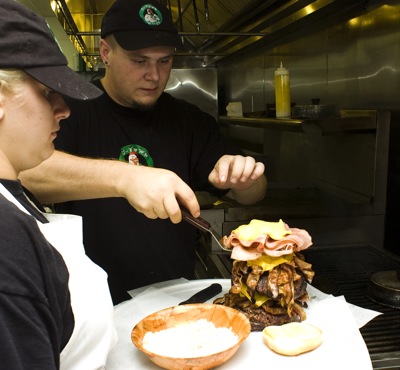Wednesday, July 20th, 2011
Animals suffer in steamy heat
By Nancy Allen
The oppressive heat this week has farmers keeping an eye on their animals.
The situation isn't critical yet but it is a concern, local farmers and ag officials say.
Carl Link, general production manager at Cooper Farms in Fort Recovery, said hogs are doing alright, but turkeys are feeling the stress.
"Mortality is up a bit (with turkeys), and their feed consumption is down 15 to 20 percent," Link said of the animals contracted through Cooper Farms. "They eat less when they are hot and drink a lot more water."
Temperatures are expected to stay in the mid 90s through the weekend with high humidity.
Link said the most important things farmers can do is make sure water supplies are not compromised and that fans and water misting systems are working. Animals also need checked on more frequently for signs of heat stress, he added.
"Hogs are easier because we can run dripping water to them and they get their snoots wet and it cools them down," Link said. "Turkeys are harder to cool down because they have to breath through their mouths (pant) to cool their bodies down."
Growers should walk through their turkey barns to get the birds up so they don't sit for long periods and overheat. Walking helps turkeys release body heat. Link said bird numbers in some barns have been reduced to improve circulation and lower inside temperatures.
Dairy cattle also are being affected.
The ideal temperature for a cow is 41 to 77 degrees, information from the Virginia Tech Extension says. Milk production can drop 20-30 percent when temperatures exceed 90 degrees as the animals expend energy trying to stay cool instead of making milk.
Montezuma area farmer Chuck Schwieterman said the heat is taking a toll on his hogs and dairy cattle. It's bad, he said, but added he's seen it before and will get through it.
"Feed intake is down on both," Schwieterman said. "When feed intake is down, the hogs don't grow as good and the cows don't produce as much milk."
Schwieterman estimates his cows' milk production is down about 10 percent.
Hot weather used to affect animals more years ago. Fans and misters, now standard in most confined animal feeding operations, help a lot, he said.
"We walk through the herd and if anybody is under stress we deal with them," he said of his cows. "We've got maternity pens we can bring an animal to and put a fan on her and some water."
Barb Phares, OSU Extension educator for 4-H Youth Development in Mercer County, said smaller animals overheat much more quickly because they have fast metabolisms. That's why poultry and rabbits feel the effects of heat more severely.
Frozen water bottles kept in poultry and rabbit cages help those animals stay cool, she said. Changing water often and placing fans on them also helps.
When heat stressed, most animals breath heavy or pant, she said. Rabbits stretch completely out on their sides and move very little, while chickens lie on their stomachs with their wings outstretched to maximize body surface area for cooling. Cows sometimes froth at the mouth.
An overheated animal can convulse and die, Phares said, adding that if high temperatures continue into fair week in August, organizers and 4-H youths will be keeping a close eye on their animals.
